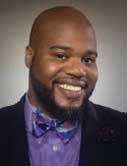Participants in innovative undergraduate initiatives such as the Undergraduate Research Program (URP) and Research Apprenticeship Program (RAP) at the University of Wisconsin, Whitewater (UW-W) campus say they see positive strides for minority, low-income and underrepresented students.
URP, whose mission is to “create opportunities for inclusive participation,” is one of 15 programs that reside within the Office of Student Diversity, Engagement and Success (SDES). Some other high impact practice programs within this office are the McNair Scholars Program, Pre-College Program, King/Chavez Scholars, University Honors Program, Community-Based Learning, and the Office of Global Experiences, to name a few.
Research indicates that students who are engaged with their institution’s programs and clubs have a greater likelihood of favorable outcomes and success, said Dr. LaVar J. Charleston, the assistant vice chancellor of the Student Diversity, Engagement & Success Department at UW-W.
 Dr. LaVar J. Charleston
Dr. LaVar J. CharlestonThe literature “preaches the likelihood of matriculation through graduation, and also sort of prepares students for global readiness for the workforce,” Charleston told Diverse.
“One of the things about the undergraduate research program is that preliminary data indicate that … students who are participating in our RAP program, they are more likely than their nonparticipant peers to graduate at the six-year graduation rate,” said Charleston. “We are really looking at how to shrink the gap.”
RAP is offered to undergraduate freshmen, sophomores and transfer students and makes a priority of recruiting students from traditionally underserved populations.
“The URP and UW-W believe that part of a successful approach to retaining a diverse population of students and closing the achievement gap is to provide equitable access to high quality educational programs or practices that are known to be impactful for student retention and success,” said Dr. Catherine Chan, director of the URP and associate professor of biological sciences and chemistry.
 Dr.Catherine Chan
Dr.Catherine Chan“In particular, the URP not only strives to provide great scholarly opportunities and mentors for our students but we also intentionally reach out to student groups that are historically minoritized and do not participate in undergraduate research as much as other more privileged groups” Dr. Chan said. “To further reduce the barrier against participation in research, RAP provides a stipend to student participants.”
Chan has co-authored several publications studying how successful URP is in providing underserved students with opportunities to get involved in mentorship and research programs.
She, along with fellow UW-W professors Dr. Prajukti Bhattacharyya and Dr. Meg Waraczynski, recently published the chapter titled, “A Model for Successful Cross-Campus Collaboration for Engaging Potentially At-Risk Students in Mentored Undergraduate Research Early in Their College Career.” The report focused on RAP and select institutional and academic outcomes of UW-W students.
“We showed that RAP is successful in recruiting students from traditionally underserved groups and those who are just beginning their college careers – i.e., primarily freshman students – to participate in mentored research,” Chan said.
“For a program like RAP to be successful,” she added, “collaboration is a crucial element, as we need partners for effective recruitment of students and mentors, as well as the support from campus administrators and the community at large.”
The report found that around 20 percent of students involved in the URP continue engaging with the program for several years.
The demographics of student participation in RAP include 65 percent White, 12 percent Latinx, 8 percent African-American, 5 percent Asian, 3 percent international and 7 percent biracial or multiracial.
Helping Hawaiian students
One of the opportunities that’s offered in partnership with UW-W is the Aloha MAP, or Meritorious Achievement Program. It is a Native Hawaiian education summer project started by Native Lilinoi Grace that partners with universities to teach children culturally relevant academic and cultural learning in efforts to reduce summer learning loss, improve proficiency in math and language arts and increase Hawaiian cultural awareness, according to Aloha MAP’s website.
The partnership began from a funded proposal by Dr. Bhattacharyaa titled “Faculty Initiative for Research/Scholarly/Creative Excellence (FIRE)”.
 Aloha MAP students work on a project in Hawaiian classroom
Aloha MAP students work on a project in Hawaiian classroomUW-W students Kalama Kamoku, Lucas Murray and Ryan Workman and recent graduate James Konvalinka participated in this year’s Aloha MAP, where they received individual URP research grants. They taught STEM, focusing particularly on earthquakes, volcanoes, navigation using cardinal directions and other sciences that will be useful for the students.
Kamoku, a Native Hawaiian, was interested in participating in the program after seeing some of his family members previously work in it and to feed his passion of giving back to his community.
“Personally, my favorite part was reconnecting to my culture, things I had not known prior to leaving the islands when I was 9 years old,” Kamoku said. “Having these kids teach me Hawaiian and in return teach them science was probably the best experience in being part of Aloha MAP.”
Kamoku and other students told Diverse that working with Aloha MAP was the most fun experience they’ve had.
“It was so helpful for me to be put in another culture and really learn about who I am as a person. I feel a lot of people need to go through something like this in order to really help them grow and develop as an individual,” Konvalinka said. “Along with that, it was amazing being able to help their community and give back with knowledge and information that can help them. They [The Hawaiian people] treated us like family, and we really felt like we were.”
You can reach Monica Levitan at [email protected]. You can follow her on Twitter @monlevy_





















